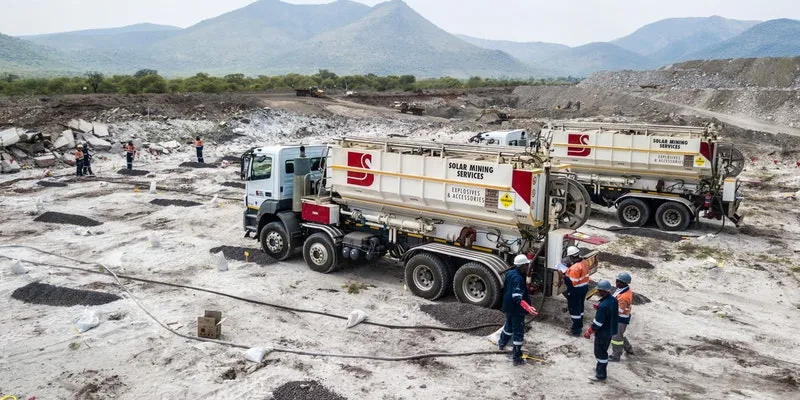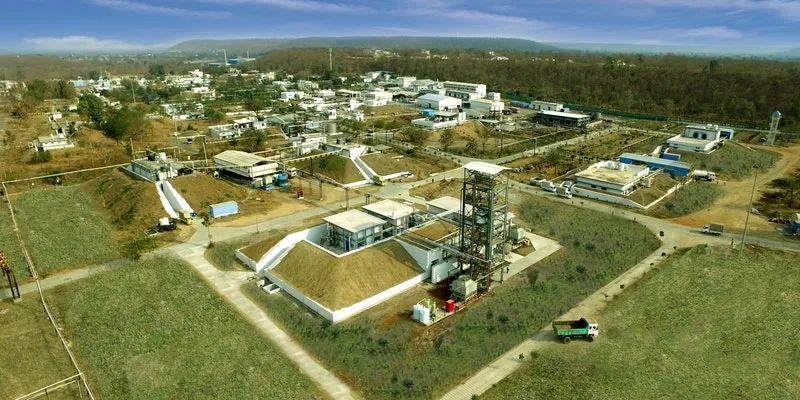From a failed start, empty pocket, and mortgaged jewellery to raking Rs 2,500 Cr revenue: the story of Solar Industries
In 2006, Solar Industries went for an IPO. But entrepreneur Satyanarayan Nandlal Nuwal, who started the explosives manufacturing company in 1984, had humble beginnings. Here is the story of how he came to work with the Indian defence forces and his company raked in Rs 2,461.6 crore revenue.
Behind every success story that comes into the limelight, there are countless behind-the-scenes failures, challenges, and disappointments. It takes patience, perseverance, and grit to overcome these thorns in your path to success.
As India celebrates its 71st Republic Day, a day that commemorates the sweat and tears of many men and women of the freedom movement, we at SMBStory bring you the inspirational story of Satyanarayan Nandlal Nuwal, a 67-year-old entrepreneur who laboured under a lot of struggles when he started his business journey in the 1970s. Little did he know that over the years his company, Solar Industries, would become one of the leading manufacturers of explosives, detonators, and get a license from the government to make explosives for India’s Armed Forces.

Satyanarayan Nandlal Nuwal, Founder, Solar Industries
“I belong to a small village in Rajasthan. I dropped out of school when I was in Class X to find my luck in the business. But, at that time, I was too innocent to understand that business is gruelling at times. I tried my hand at many things, including a leasing business and a transport company but everything failed,” he recalls.
Satyanarayan then moved to Nagpur to work with a relative. He didn’t have enough money to rent out a house and spent his initial nights in the big city sleeping in the railway station.
But the dark clouds soon parted after months of struggle when Satyanarayan got a licence to trade explosives and a warehouse to store them, paying a monthly fee of Rs 1,000 rupees to the licence holder.
The entrepreneur spent several years supplying explosives to the state-owned coal mines and as a consignment agent for Imperial Chemicals Industry. Yet things were rough, and money was tight.
By the mid-1990s, the competition had picked up as several companies had come in as consignment agents. With margins getting squeezed, and his wife mortgaging her jewellery to raise funds to survive, Satyanarayan decided it was time to go beyond trading and start manufacturing explosives.
In 1995, he made modest efforts to found Solar Industries in Nagpur, first as an explosives trading business and, a year later, a manufacturer of the same from a small plant. To set up the unit, Satyanarayan invested a capital of Rs 1 crore.
In an in-depth interaction with SMBStory, the first-generation entrepreneur delves into the highs and lows of his journey.
Edited excerpts from the interview:
SMBStory: What does Solar Industries do?
Satyanarayan Nandlal Nuwal: Solar Industries is primarily an explosives manufacturing company. The company manufactures, supplies, and exports industrial explosives and initiating systems. It manufactures various explosives products, such as slurry and emulsion base explosives comprising bulk explosives, packaged explosives, pentaerythritol tetranitrate (PETN), and accessories like cast booster, detonators and detonating fuse, etc. Its products are used across mining and infrastructure sectors.
The company has 25 manufacturing plants in eight states in India and four in overseas locations. The company offers its products to over 50 countries across the globe. It has manufacturing facilities at Zambia, Nigeria, Turkey, and units in South Africa, Ghana, Australia, and Tanzania are coming up.
Solar Industries offers high energy explosive (HMX) and HMX compounded products, propellants, warheads, ammunitions and complete integration of rockets and missiles to the defence sector.
The company had received ToT for mass production of the crucial solid propellant booster of Brahmos Missiles in 2018.
Along with defence, Solar Industries is entering into the new promising vertical of ‘propulsion system for space application’. The company has entered into the business for space application, which is synergistic with the current business of defence ammunition, while explosives still remain the primary business.

Solar Industries mining project
Today, Solar Industries is one of the leaders in the domestic industrial explosives market with a dominant share of 25 percent, a sizable lead over the second-largest player with 12 percent market share. Our revenue contribution from domestic markets stands at 65 percent while exports and overseas constitute balance 35 percent.
Solar Industries went public in 2006 and in FY19, the company clocked a revenue of Rs 2,461.6 crore.
SMBS: What is the company’s channel strategy?
SNN: We have leveraged our two decades of experience to provide a diversified product portfolio ranging from industrial explosives like bulk and packaged explosives to initiating systems and defence explosives.
Solar also has a strong dealer network for cement, limestone gold, and other huge extractions.
Recently, the company has entered into the business of propulsion system for space application, which is synergistic with the current business of ammunition. In line with our strategic decision to cater propulsion system for space application, the company has decided to make an equity investment in Sky Root, a startup that is entering into the business of launching small satellites, in a phase of two years. The company has received supply order from Indian Space Research Organisation (ISRO) as well.
We are confident that we will be able to increase our growth in the explosive industry through capacity expansions and new product portfolio. Our products and services have been well accepted in the international markets and our existing overseas plants will continue to increase volumes.
SMBS: What challenges have you faced in terms of sustaining and growing the business?
SNN: The turning point was when we realised that there is a concentration of user industry contribution to the business of the company, by up to 60 percent of the revenues till 2007 from coal mining, and Solar a shift in focus to other verticals as well.
The company’s efforts in the last 14 years have resulted in well-diversified product profile and geographical presence. The contribution from another segment of the businesses like housing & infrastructure has gone up to as high as 27 percent of Solar Industries’ revenues, and seven percent from the defence business.
SMBS: What is the market size of your sector and what advice do you have for those wanting to venture into the same kind of business?
SNN: The global mining explosives market stood at about $13,900 million in 2018 and was estimated to reach $14,250 million by the end of 2019. According to industry reports, the market size is expected to increase to $16,800 million by 2025.
Though the explosives industry shows better prospects for the future in India, there are serious entry barriers in the industry like government policies, environmental clearances, need for licences, huge land, etc. Moreover, the replacement cost to set up an explosives factory has been increasing with longer payback period, considering the rise in the cost of capital. So, one should consider these things before starting up in the explosives business.
SMBS: Can you tell us about the key milestones in your business journey?
SNN: The last few years have been milestone years for R&D at Solar in the field of new products development, products efficiency improvements and up-gradation of product quality and performance.
The development of multi-mode grenade for the armed forces has been a great achievement for us. The product has stringent quality parameters and the Defence Research and Development Organisation (DRDO) had taken up this project in the late nineties and had been working on its development and user trials since 2011.
By 2013, the company commenced the manufacturing of three-layer shock tubes and also started the commercial production of electronic detonators.
In 2018-19, Solar Industries became the first Indian company to cross production of 450,000 million tonnes of explosives.

Solar Industries' Chakdoh plant
SMBS: What are your future prospects?
SNN: We are very positive on the outlook of mining explosives industry and defence products. The industry shows a huge opportunity across the globe in terms of mineral extraction and defence products. We have set a target for ourselves to increase our presence in five other countries in the coming years and we believe that we will be able to reach our goals considering our focus on both at the operational and financial level.
In our mining segment, we expect Coal India’s production output to increase in the coming period as contracts will get finalised and labour problem will also get resolved. India’s coal requirement is forecasted to go up to 1,123 Million tonnes by 2023 from the present level of 700 million tonnes.
Our housing and infra customer segment also shows a constructive outlook. With the interest rates expected to come down, the housing sector is bound to pick up in the coming years. In the defence segment, we have been able to increase our product portfolio, which is helping us get more orders from both domestic and international markets. At the international level, many countries are looking at us for a source of supply having assessed our quality and competence to be on par with global manufacturers.
The Indian government has announced the offset policy being tweaked to give incentives to invest in defence production. It has decided that all ammunition in the long term should be procured indigenously and exports of defence should double in the coming years.
In exports business, our new overseas operations points in Australia and Ghana will be operational in FY20. With increased exports and overseas expansions, we anticipate consistent growth from these segments in the coming years. We expect domestic offtake to increase substantially as Indian defence establishments are streamlining their domestic procurement procedures, and since as testing and validations of most of our products are completed. Our overseas operations at Zambia and Nigeria will witness more stability in the coming period.
(Edited by Evelyn Ratnakumar)









